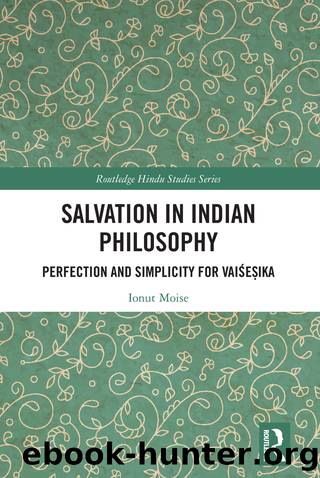Salvation in Indian Philosophy by Moise Ionut;

Author:Moise, Ionut; [Moise, Ionut;]
Language: eng
Format: epub, azw3, mobi
Publisher: Taylor & Francis Group
Published: 2020-10-15T00:00:00+00:00
Self and the cosmic cycle214
One of the most problematic concepts within VaiÅeá¹£ikaâs soteriology is saá¹sÄra, mentioned only once (VSc 5.2.19), and possibly hinted in few other places (VSc 5.2.14 and VSc 6. 2.18). The problem in conceptualising it stems from the very doctrine of Ätman, which, as many scholars note, changed throughout the history of the system. Usually, substances that are all-pervasive (diÅ, kÄla, ÄkÄÅa, Ätman (VSc 5.2.23), cannot be subject to action, therefore cannot move from one body to another. If this is so, what then is that which moves or transmigrates in Ätman in saá¹sÄra? The short answer to this question seems to be given by VSc 5.2.19 where mind appears to be that which transmigrates from movements such as apasarpaá¹a (âgoing awayâ), upasarpaá¹a (âgoing inâ, or ânearâ), namely through the conjunctions with things âeatenâ (aÅita), and âdrunkâ (pita), presumably atomic, as is the mind itself.215 VaiÅeá¹£ikaâs cosmology builds mainly upon the atomic theory, according to which matter is composed of mahÄbhÅ«tas, which ultimately are compounded by atoms bearing âultimate characteristicsâ (antyaviÅeá¹£a). The process of saá¹sÄra, therefore, should happen at the atomic level.216 âAÅitapÄ«tasaá¹yogaâ from sÅ«tra 5.2.19 refers to the connection between mind with (the atoms of) food and drink which subsequently âconjoins with others entitiesâ (kÄryÄntarasaá¹yoga), such as âsemenâ (Åukra) or âbloodâ (Åoá¹ita) which âbrings forthâ (prabhá¹ti) the foetusâ (garbha) of a motherâs womb. Mind (manas) enters through a âveinâ (nÄá¸Ä«), which is the carrier of the blood, and which in Indian classical thought is the channel through which the âsubtle bodyâ or the âsubtle physiologyâ of the body circulates.217 In VaiÅeá¹£ika, this âsubtle physiologyâ must be identified with the set of nine vaiÅeá¹£ikaguá¹as which have their locus in manas. The saá¹sÄric process includes not only the âretreatingâ of mind (apasarpaá¹a) from a certain locus, its âconception through a veinâ (nÄá¸yanupraviá¹£á¹ena), or âentranceâ (upasarpaá¹a) into the garbha218 but also various stages of development of garbha itself, ranging from kalala, arbuda, mÄá¹sa, peÅÄ«, and ghana, all of which constitute stages of growth corresponding to the old Vedic rites of passage.219 The conceptual problems of saá¹sÄra can be overcome only if we admit that the VaiÅeá¹£ikas maintain an allpervasive size of the soul (like ÄkÄÅa); yet the problem arises because VaiÅeá¹£ika seems to maintain both the all-pervasive character of Ätman (VSc 7.1.28-29), and the individual size (VSc 3.2.16) because, as CandrÄnanda argues, each soul has individual characteristics, therefore it must be different and plural (VSc 3.2.16â17).220 In both SÅ«trapÄá¹ha and VSc we seem to have both views expressed, and CandrÄnanda must have maintained both oneness and plurality of the Ätman rather than the hypothesis launched by scholars as to the evolution of the size of Ätman, from âthumb-sized soulâ221 to âomnipresentâ.222
Another passage, which hints at the saá¹sÄric process is the gloss VSc 6.2.18; it is not certain whether the process refers to Ätman; the subject of 'conjunction' and âdisjunctionâ dharmic processes therein described is the âbeingâ (jantu) which âreturnsâ (Ävartate) like a âpot-machineâ (ghaá¹Ä«yantra) (VSc 223 6.2.18).223 Ätman, as pure substance, is not mentioned and the omission may be voluntary.
Download
Salvation in Indian Philosophy by Moise Ionut;.azw3
Salvation in Indian Philosophy by Moise Ionut;.mobi
This site does not store any files on its server. We only index and link to content provided by other sites. Please contact the content providers to delete copyright contents if any and email us, we'll remove relevant links or contents immediately.
| Anthropology | Archaeology |
| Philosophy | Politics & Government |
| Social Sciences | Sociology |
| Women's Studies |
The remains of the day by Kazuo Ishiguro(8411)
Tools of Titans by Timothy Ferriss(7828)
Giovanni's Room by James Baldwin(6820)
The Black Swan by Nassim Nicholas Taleb(6783)
Inner Engineering: A Yogi's Guide to Joy by Sadhguru(6449)
The Way of Zen by Alan W. Watts(6292)
Asking the Right Questions: A Guide to Critical Thinking by M. Neil Browne & Stuart M. Keeley(5362)
The Power of Now: A Guide to Spiritual Enlightenment by Eckhart Tolle(5347)
The Six Wives Of Henry VIII (WOMEN IN HISTORY) by Fraser Antonia(5242)
Astrophysics for People in a Hurry by Neil DeGrasse Tyson(5004)
12 Rules for Life by Jordan B. Peterson(4166)
Housekeeping by Marilynne Robinson(4070)
The Ethical Slut by Janet W. Hardy(4042)
Skin in the Game by Nassim Nicholas Taleb(3978)
Double Down (Diary of a Wimpy Kid Book 11) by Jeff Kinney(3936)
Ikigai by Héctor García & Francesc Miralles(3902)
The Art of Happiness by The Dalai Lama(3851)
Skin in the Game: Hidden Asymmetries in Daily Life by Nassim Nicholas Taleb(3736)
Walking by Henry David Thoreau(3689)
